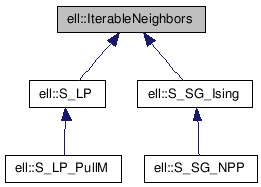ell::IterableNeighbors Class Reference
#include <IterableNeighbors.hh>
Inheritance diagram for ell::IterableNeighbors:

Detailed Description
The IterableNeighbors interface allows a generic NeighborList for neighborhood generation. Therefore, a neighbor indexing and access has to be provided by the implementing State subclass.
Definition at line 16 of file IterableNeighbors.hh.
Public Member Functions | |
| virtual State * | applyNeighborChange (const size_t index, State *const copy) const =0 |
| virtual State * | getNeighbor (const size_t index, State *neigh) const=0 |
| virtual size_t | getNeighborNumber (void) const =0 |
| virtual State * | undoNeighborChange (const size_t index, State *const neigh) const =0 |
| virtual | ~IterableNeighbors () |
Constructor & Destructor Documentation
| virtual ell::IterableNeighbors::~IterableNeighbors | ( | ) | [inline, virtual] |
Definition at line 20 of file IterableNeighbors.hh.
Member Function Documentation
| virtual State* ell::IterableNeighbors::applyNeighborChange | ( | const size_t | index, | |
| State *const | copy | |||
| ) | const [pure virtual] |
Applies the necessary changes to a given state to get the neighbor. Note: @copy is expected to be a copy (i.e. *this == *copy) and therefore direct changes are possible and != NULL.
- Parameters:
-
index the neighbor to generate copy a copy of *this the changes should be applied to
- Returns:
- copy = the neighbor state of the given index or NULL if the index is out of range
Implemented in ell::S_LP, ell::S_SG_Ising, and ell::S_SG_NPP.
| virtual State* ell::IterableNeighbors::getNeighbor | ( | const size_t | index, | |
| State * | neigh | |||
| ) | const [pure virtual] |
Access to a specific neighbor.
- Parameters:
-
index the index of the neighbor in [0, getNeighborNumber()) neigh if != NULL this state should be converted into the neighbor otherwise a new one is created and returned
- Returns:
- the new neighbor state or NULL if the index is >= getNeighborNumber()
Implemented in ell::S_LP, ell::S_SG_Ising, and ell::S_SG_NPP.
| virtual size_t ell::IterableNeighbors::getNeighborNumber | ( | void | ) | const [pure virtual] |
How many neighbor indices are accessible.
- Returns:
- the number of neighbors
Implemented in ell::S_LP, and ell::S_SG_Ising.
| virtual State* ell::IterableNeighbors::undoNeighborChange | ( | const size_t | index, | |
| State *const | neigh | |||
| ) | const [pure virtual] |
Undo the changes done to this state to generate the given neighbor. The goal is to do less operations than doing a full copy like (*neigh = *this).
- Parameters:
-
index the neighbor index that was applied last [ 0, getNeighborNumber() ) neigh the state resulting from the last changes
- Returns:
- the copy of this object via undoing the last changes in neigh or NULL if neigh == NULL
Implemented in ell::S_LP, and ell::S_SG_Ising.
The documentation for this class was generated from the following file:
- src/ell/IterableNeighbors.hh
